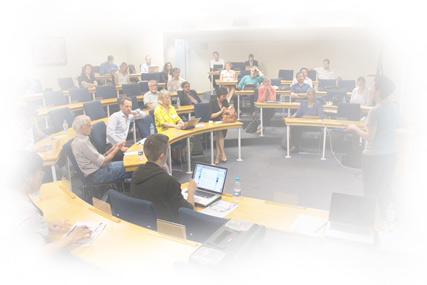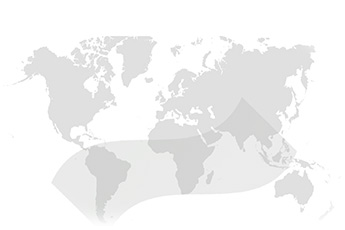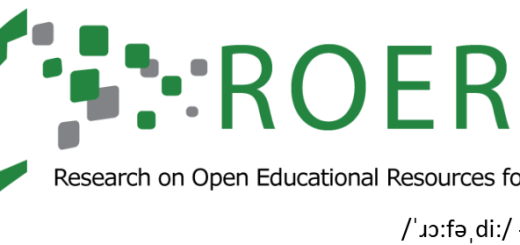‘hack NY2011 Spring Student Hackathon’ by @matylda. Made available under a CC BY-SA 2.0 licence.
In this blog post, Sukaina Walji talked to Thomas King about his recent Master’s submission. Supervised by A/Prof Cheryl Hodgkinson-Williams, Thomas recently graduated with a Master’s in Education. The title of his thesis was ‘A case study of student adaptation of Open Educational Resources at the University of Cape Town: A Diffusion of Innovations approach’. Thomas is currently the Research Administrator in the Curation and Dissemination team in the ROER4D project.
Motivated by concerns about the sustainability of OER production and in particular the time and skills needed by academics to create OER, the role of students working with lecturers to adapt materials to be released as OER is a fruitful area of enquiry. This was the premise behind the Vice-Chancellor’s Open Educational Resources Adaptation project, run at the University of Cape Town from May 2013-April 2014 which cast students in the role of ‘hunter-gatherers’ and adapters of OER who would work with lecturers to add the requisite capacity to OER adaptation and sharing. Not only do postgraduate students have more time than academics to work on OER, but as senior students who often act as tutors to undergraduate students, they experience their departments’ teaching and learning materials as both students and teachers, developing pedagogical expertise while remembering experiencing the materials from the learner’s’ perspective.. Students were employed across UCT’s academic faculties, based on the idea that students localised within specific disciplines would have a level of disciplinary familiarity facilitating the adaptation work and would be able to draw on personal and peer networks to communicate with and work with academics. Thomas’ role in this project was the student coordinator who supported students and oversaw their work.
In terms of understanding the role of the students in the OER Adaptation process, Thomas explained it using each component of the term “OER”:
- The “O” as in Open refers to the legal and copyright skills which would enable students to review lecturer’s lecture notes, identify third-party copyright and then rework or reproduce notes resources as OER.
- The “E” as in Education refers to the pedagogical input and insights that students might bring to bear while adapting the materials. For example a student adapter might suggest further explanations or scaffolding for a given resource.
- The “R” as in Resources refers to the technical skills that students might bring to OER adaption processes such as skills in formatting, attaching metadata and other technical curation.
In terms of the roll-out of the project, students approached lecturers and asked for their teaching materials in order to create the materials as OER. Some of the lecturers had previously shared OER or had been involved in some other similar project such as Open Access publishing. The students offered to do the majority of the adaptation work in consultation with the lecturer; most adaptation was performed individually and then signed off by the lecturer, as the main motivation being to take away the time burden for OER creation and/or adaptation from lecturers.
Outcomes of the project
The project took place over the course of a year and saw materials adapted in areas of Physics, Mathematics, Economics, Politics, Film and Media, and the completed OER were added to OpenUCT repository with the materials comprising primarily of lecture slides, presentation, notes, and skills development exercises used in tutorials, with a smaller number of textbooks and videos.
Of the three roles envisaged for the students, the study found that students were most confident with copyright clearance tasks (‘Open’) and technical curation (‘Resource’) issues. However, in terms of the ‘educational’ component where students would provide input into the pedagogical aspects of OER adaptation, students were often reluctant to do this and some felt anxious about advising academics on how they should teach. In the few case students did exercise this role, they had been involved in co-authoring the original resources in their prior role as departmental tutors.
Feedback from students suggested they found the project’s training sessions in understanding Creative Commons and copyright to be helpful. However the students did not coalesce into a community of OER practitioners as was an initial hope of the project and they often found it difficult to approach lecturers despite their peer and faculty networks. In their feedback, students suggested more regular meetings with the coordinating team would have been helpful.
In reflecting on how students could act in support of institutional OER production projects, it was clear that students were less successful at “hunter-gathering” OER content than they were with adapting OER legally and technically. Where students were more successful with acquiring OER were in situations where the OER emanated from tutorials students ran themselves, and these groups produced the largest amount of content. Lecturers perceived the project as a student initiative rather than an OER initiative and were relatively hands-off in the OER creation and production process.
Looking at how an OER adaptation process might move into mainstream academic work at a university such as UCT, where there is no mandatory incentive for OER production, it was found that students are best placed as ‘capacitating agents’ for OER production rather than change agents for OER acquisition.Thomas’s findings also suggest that focussing on the adaptation is less important than focussing on ways to encourage academics to share teaching materials which can then be adapted. The challenge is particularly acute in contexts such as UCT which has an enabling environment for OER (in terms of lecturers being allowed to share their teaching materials as OER), but no particular incentives for academics to get involved in OER. This means that students were less able to influence academics or work with them to find and acquire OER. Thomas’s work has added to understanding how students can support OER in an institution, and he will be presenting his work at the OE Global Conference in March 2017.






